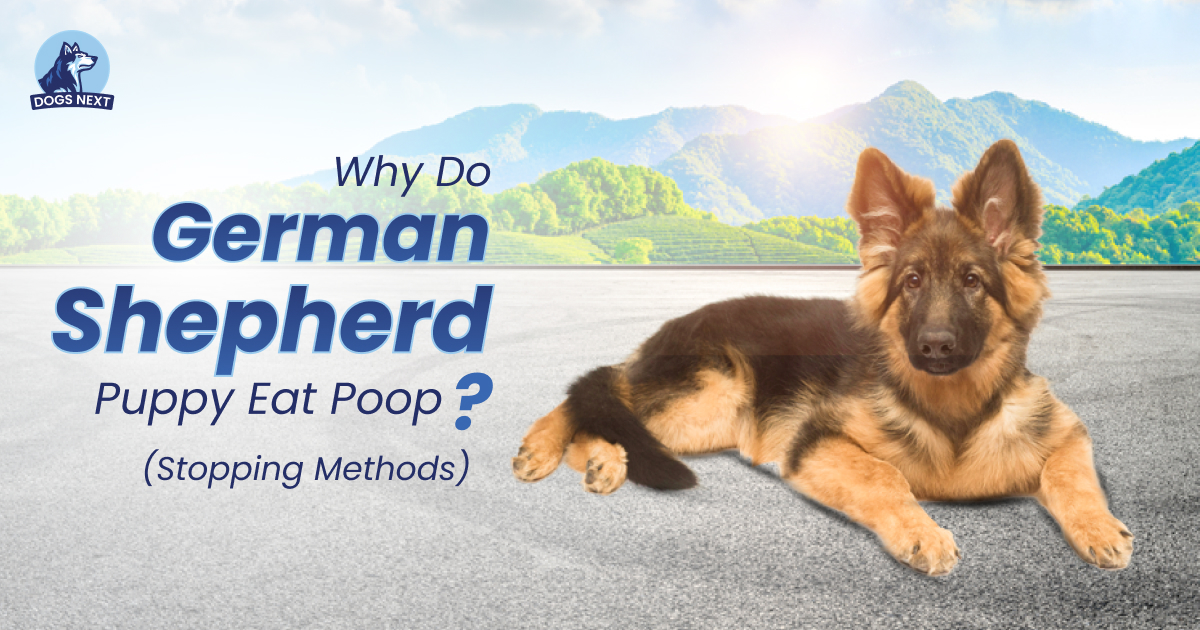Coprophagia, or the act of eating feces, is not uncommon in dogs, including German Shepherd puppies. While it can be a disgusting and unpleasant behavior, it’s not necessarily a sign of a serious underlying health issue. In some cases, it may also be a sign of an underlying medical condition, such as digestive issues or parasites.
If you are a new pet parent and have a German Shepherd puppy, you may be concerned and confused about their behavior of eating poop. You may wonder why they are doing this and if it is normal. This article will explore the reasons why your German Shepherd puppy eat poop and what you can do to stop it.
My German Shepherd Puppy Eat Poop is it Coprophagia?
Coprophagia, or the act of eating poop, is a common behavior among dogs, including German Shepherds. It can occur in puppies and adult dogs and can be caused by several reasons. Some dogs may engage in coprophagia due to boredom, stress, or curiosity, while others may do so due to nutritional deficiencies or underlying medical conditions.
In some cases, coprophagia can also be a learned behavior, particularly if the dog observed this behavior from other dogs or received positive reinforcement for doing so. Understanding the underlying reasons for coprophagia and working with a veterinarian can help prevent this behavior and ensure your German Shepherd’s overall health and well-being.
Why Do German Shepherds Eat Poop? Uncovering the Causes Behind Coprophagia
Now, let’s take a closer look at why your beloved German Shepherd may feel compelled to eat their own poop. It’s a behavior that can be concerning for many dog owners, but by gaining a better understanding of the possible causes behind coprophagia, you can take the appropriate steps to address the issue and ensure your dog’s health and well-being.
- Nutritional deficiencies: Dogs may eat poop to compensate for a lack of nutrients in their diet.
- Digestive issues: German Shepherds with digestive problems may eat poop to help alleviate gastrointestinal distress.
- Learned behavior: Some dogs may learn to eat poop from other dogs or through positive reinforcement.
- Boredom: German Shepherds who are bored or have a lack of stimulation may eat poop out of curiosity.
- Attention-seeking: Some dogs may eat poop to get attention from their owners or other dogs.
- Stress: Stress and anxiety can cause dogs to engage in a variety of unusual behaviors, including eating poop.
- Fear: Fearful dogs may eat poop as a coping mechanism.
- Medical issues: Certain medical conditions, such as diabetes, pancreatitis, and thyroid issues, can cause dogs to eat poop.
- Pica: Pica is a condition where dogs crave and eat non-food items, including poop.
- Lack of training: German Shepherds that are not properly trained may eat poop out of a lack of understanding.
- Hunger: Dogs may eat poop if they are not getting enough food.
- Habit: Some dogs may develop a habit of eating poop that is hard to break.
- Motherly instinct: Female dogs may eat their puppies’ poop as a natural instinct to keep their den clean.
- Environmental factors: German Shepherds in dirty or unsanitary environments may eat poop due to the abundance of feces.
- Curiosity: Some dogs may eat poop simply out of curiosity.
- Scent attraction: Dogs have a strong sense of smell and may be attracted to the smell of poop.
- Feeding schedule: Dogs on irregular feeding schedules may eat poop out of hunger or boredom.
- Attention from other dogs: Dogs may eat poop to gain attention from other dogs in the area.
- Lack of exercise: Dogs that are not getting enough exercise may engage in unusual behaviors, including eating poop.
- Genetics: Some dogs may have a genetic predisposition to eating poop.
Medical Conditions That May Cause German Shepherd Puppies To Eat Poop
German Shepherd puppies may eat poop due to several medical conditions. Here are some of them:
- Exocrine Pancreatic Insufficiency (EPI): EPI is a condition that affects the pancreas, causing it to not produce enough digestive enzymes. This can lead to malabsorption and malnutrition, which can cause coprophagia.
- Intestinal Parasites: Parasites such as roundworms, hookworms, and whipworms can cause digestive problems in puppies. This can result in coprophagia as the puppy tries to obtain the missing nutrients from poop.
- Malabsorption Syndrome: Malabsorption syndrome is a condition that affects the small intestine, making it difficult for the puppy to absorb nutrients from food. This can cause coprophagia as the puppy tries to get the missing nutrients from poop.
- Increased Appetite: Some German Shepherd puppies have a high appetite and may eat poop due to hunger. This can be caused by medical conditions such as diabetes or hyperthyroidism.
- Gastrointestinal Disorders: Gastrointestinal disorders such as inflammatory bowel disease (IBD) and colitis can cause coprophagia in puppies. These conditions can cause digestive problems, leading to a nutrient deficiency, and ultimately causing the puppy to eat poop.
Behavioral Reasons Why German Shepherd Puppies Eat Poop and How to Stop It
German Shepherd puppies may also eat poop due to behavioral reasons. Here are some common behavioral reasons and tips to stop this behavior:
- Lack of Attention:
Puppies may eat poop to get their owner’s attention. To stop this behavior, give your puppy plenty of attention and positive reinforcement when they are not eating poop. Play with your puppy, take them for walks, and give them plenty of love and attention. - Exploration:
Puppies explore the world with their mouths and may eat poop as part of their exploration. To stop this behavior, supervise your puppy when they are outside and distract them with toys or treats when they try to eat poop. - Coprophagia Syndrome:
Coprophagia syndrome is a behavioral disorder that causes dogs to eat poop. If your puppy has this condition, you will need to work with a dog behaviorist to address the underlying cause and stop the behavior.
Tips For Dealing With Your German Shepherd Puppy’s Poop-Eating Habits.
Dealing with your German Shepherd puppy’s poop-eating habits can be frustrating and unpleasant, but here are some tips to cope with coprophagia:
- Keep Your Puppy on a Leash: When you take your puppy outside, keep them on a leash to prevent them from eating poop. This will give you more control and enable you to stop your puppy from eating poop immediately.
- Train Your Puppy to “Leave It”: Teaching your puppy the “leave it” command can help prevent coprophagia. When you take your puppy outside, practice the “leave it” command and reward them when they obey. This will help your puppy learn to leave poop alone.
- Provide Adequate Nutrition: Ensure that your puppy is getting a healthy and balanced diet that meets their nutritional needs. Nutritional deficiencies can cause coprophagia, so feeding your puppy a balanced diet can prevent this behavior.
- Increase Exercise and Playtime: Giving your puppy more exercise and playtime can help reduce stress and boredom, which can contribute to coprophagia. Take your puppy for walks, play with them, and provide them with toys to keep them entertained.
- Consult with a Vet or Dog Behaviorist: If your puppy’s coprophagia persists despite your efforts, consult with your veterinarian or a dog behaviorist. They can assess your puppy’s behavior and provide tailored recommendations to help stop the behavior.
The Role of Diet in Preventing Coprophagia in German Shepherd Puppies
Diet plays a crucial role in preventing coprophagia in German Shepherd puppies. Here are some dietary tips to prevent this behavior:
- Feed a High-Quality Diet:
Feeding a high-quality diet that is complete and balanced can help prevent coprophagia in puppies. A diet that meets all your puppy’s nutritional needs will ensure that they do not have to resort to eating poop to obtain nutrients.
- Feed Regularly and in Moderation:
Feeding your puppy regularly and in moderation can prevent them from feeling hungry and resorting to eating poop. Feed your puppy small meals throughout the day to keep their energy levels stable and prevent hunger.
- Avoid Table Scraps:
Feeding your puppy table scraps can disrupt their digestive system and cause coprophagia. Avoid feeding your puppy table scraps and stick to a healthy and balanced diet that is designed for their nutritional needs.
- Provide Fresh Water:
Dehydration can cause puppies to eat poop. Ensure that your puppy has access to clean and fresh water at all times. This will prevent dehydration and reduce the likelihood of coprophagia.
- Add Supplements:
Some supplements such as probiotics and digestive enzymes can help improve your puppy’s digestive health and prevent coprophagia. Consult your vet to find out if supplements are necessary for your puppy.
How to Stop Your German Shepherd Puppy from Eating Poop
If your German Shepherd puppy is eating poop, here are some steps you can take to stop this behavior:
- Keep Your Yard Clean
Ensure your yard is clean by picking up poop as soon as possible. This will reduce the chances of your puppy eating poop.
- Use a deterrent
Some dog owners have success using deterrents like bitter apple spray or hot sauce on poop to discourage their puppies from eating it.
- Change Your Puppy’s Diet
If your puppy is eating poop due to a nutritional deficiency, you may need to change their diet. Consider switching to a high-quality dog food that meets their nutritional needs.
- Use positive reinforcement
Reward your puppy with praise and treats when they avoid eating poop. This can help reinforce good behavior.
- Increase Attention and Playtime
Give your puppy lots of attention and playtime to reduce anxiety and stress. This will also prevent them from seeking attention through coprophagia.
Train your puppy to understand the “leave it” command. This will teach them to leave poop alone and focus on other activities.
- Consider crate training
Crate training can help prevent your puppy from having access to poop when you’re not able to supervise them.
- Seek Veterinary Help
If your puppy’s coprophagia is due to medical issues, seek help from a veterinarian. They will diagnose and treat the underlying medical condition.
Frequently Asked Questions
Q: How to stop my German Shepherd from eating poop?
Ans: To stop your German Shepherd from eating poop, you should start by ensuring that their diet is nutritionally complete and that they are not hungry. You can also try to discourage the behavior by keeping your yard clean and using positive reinforcement training. Consult with your veterinarian for further advice.
Q: How to clean my German Shepherd’s mouth after they’ve eaten poop?
Ans: Cleaning your German Shepherd’s mouth after they have eaten poop is important to prevent the spread of harmful bacteria and parasites. Use a pet-safe toothbrush and toothpaste to brush their teeth, and offer them water to rinse their mouth. You can also give them a treat that helps freshen their breath.
Q: Why does my German Shepherd poop so much?
Ans: German Shepherds can poop more frequently than other breeds due to their high energy and active lifestyle. However, excessive pooping can be a sign of an underlying health issue such as parasites, food intolerance, or inflammatory bowel disease. Consult with your veterinarian if you are concerned about your German Shepherd’s bowel movements.
Q: Why does my German Shepherd have loose stools?
Ans: Loose stools in German Shepherds can be caused by a variety of factors, including diet changes, food intolerance, parasites, infections, and stress. Provide your German Shepherd with plenty of fresh water, monitor their diet, and consult with your veterinarian for advice on treatment and prevention.
Conclusion
In conclusion, understanding why your German Shepherd puppy eats poop is essential in finding the right solutions and preventing any negative consequences on their health. Coprophagia or poop-eating behavior can be a frustrating issue for German Shepherd puppy owners, but with proper care, it can be managed effectively.
From dietary to medical and behavioral reasons, there are various factors that can contribute to this behavior. Always consult with your veterinarian before making any changes to your puppy’s diet or behavior. With patience, consistency, and proper care, you can help your German Shepherd puppy overcome this behavior and enjoy a healthy and happy life, free from the urge to eat poop.

I’m David, an expert contributor and writer, with two furry friends of my own, I know the challenges of raising and caring for dogs. From training to nutrition and health, my goal is to provide valuable insights and advice to help create strong bonds and happy, healthy lives. Find me in Twitter.




